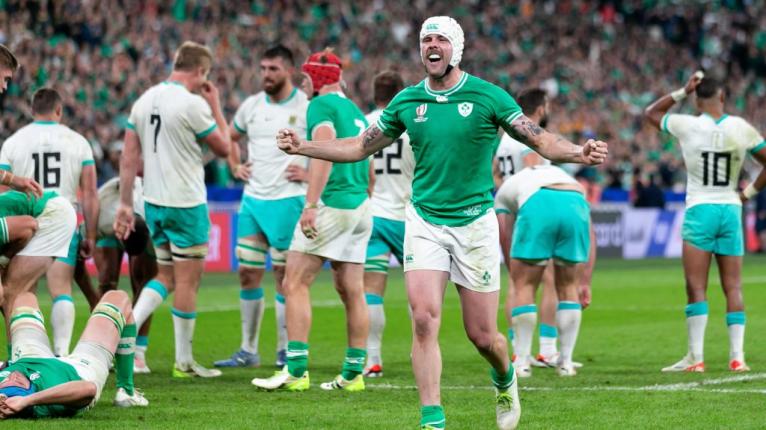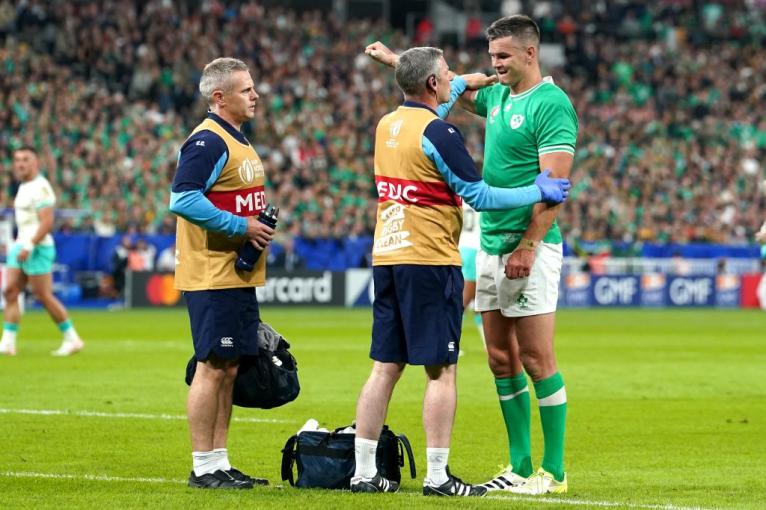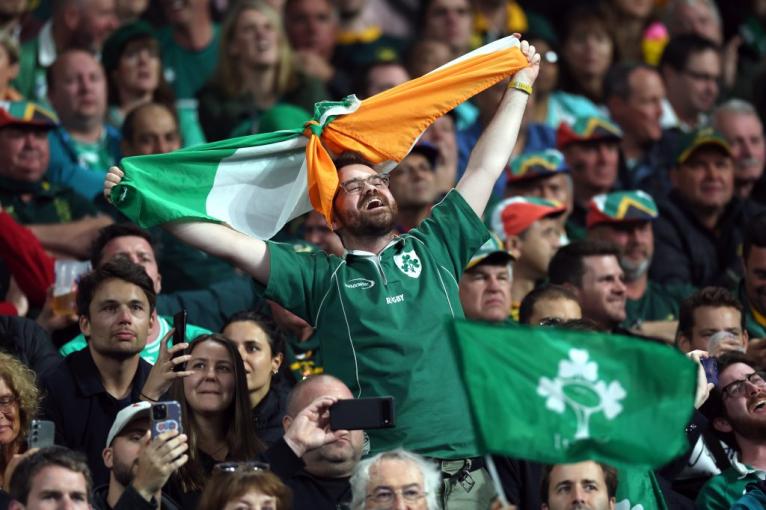It was the aftermath of a November international at Lansdowne Road 21 years ago. The final whistle had sounded and the man on the PA decided it was time to mark the occasion by finding the right song.
The rain was falling, the wind swirling and a winter’s chill bit into the bones. But Ireland had just beaten the world champion Wallabies, their first victory over Australia in 23 years. So ‘Beautiful Day’ by U2 seemed an entirely appropriate soundtrack. The crowd loved the choice and the players, led by their youthful captain, Brian O’Driscoll, milked the applause on a lap of honour.
Eyebrows rose. A lap of honour to celebrate a win in November? Seriously?
Afterwards Eddie Jones was asked to sum up what the day meant to both teams and in his inimitable way, he gave with one hand before taking with the other. “Ireland were good today,” Jones, in his first spell as Australia coach, reflected. “But we look forward to playing them next year (at the 2003 World Cup) on a dry track.”
You could see why. Because when it mattered most, Australia won.
That’s the recurring theme. Australia in 2002, England each year from 2004 to 2007, South Africa in 2009, New Zealand in 2016 and again in 2018, the Springboks last November and again on Saturday night, Ireland have plenty of experience of beating the reigning world champions.
But not when it counts.

Yes, Saturday’s 13-8 win over the Springboks carries some significance, seeing as it opens up an easier path to a final.
But let’s return to reality here. Saturday night was a pool match. No medals have ever been awarded to a team for winning respect. And right now, hysteria is spreading through Ireland way faster than Covid-19 ever did when a calmness vaccine is what the nation needs.
Yet it won’t be easily attained because with the exception of Westlife and Boyzone, you will do well to come across a group of Irishmen who know what it is like to be No 1. The football team peaked at No 8 in FIFA’s world rankings, and for a brief period before the last World Cup, the Joe Schmidt led team topped the charts.
But not for long. Defeats to hosts Japan and then the All Blacks turned the 2019 World Cup into a disaster. That’s what World Cups tend to be for Ireland. They’ve won big pool matches before – Wales in 1995, Argentina in 2003, Australia in 2011, France in 2015, Scotland in 2019 – and then come up short when it really counted.
If that’s not a cautionary tale then how about this one. In 2007, Ireland defeated England at Croke Park, the first game between the two nations at a venue where British soldiers had assassinated innocent Irishmen nearly a century earlier.
A queue of people were lining up to ask if you were going to bring the Webb Ellis Cup with you the next time you went shopping.
Eddie O’Sullivan
Croke Park opened its doors and 83,000 people opened their ears to God Save the Queen. “If there was one rugby match we could not afford to lose, it was that one,” the then Ireland coach, Eddie O’Sullivan reflected. “England coming to Croke Park for the first time, we had to win. Nothing else was acceptable.”
They did win, but in doing so, the hype generated eventually caught up with the team, who flew out to that year’s World Cup with hope, but who returned home before the postcards, finishing third in their pool.
“For six months, you couldn’t escape the talk,” O’Sullivan says. “I had to stop going to the local supermarket. You’d be standing there thinking, ‘I must get two litres of milk’ and a queue of people were lining up to ask if you were going to bring the [Webb Ellis] trophy with you the next time you went shopping. Expectations went through the roof.”
They have gone even higher this time. Saturday’s capture of the Springboks scalp was the 16th win in a row for a team who, since June last year, have won a series in New Zealand, a clean sweep in the November’s series, a grand slam and are now three from three in this tournament.

Impressed? Well, look at these facts. Since the first staging of the World Cup in 1987, only five countries — New Zealand, Australia, South Africa, England and France – have reached the final and in the last year and a bit, since a loss to the All Blacks at Eden Park, Ireland have met those five teams seven times, winning each game. Little wonder they are being talked up.
So, let’s consider then the following words from Ireland’s lock forward Iain Henderson:
“I wouldn’t necessarily say we’re exceptionally comfortable with expectation levels, with everyone thinking this, that or the other — but we’re relatively good at blocking them out,” Henderson said. “Outside of match week, when we’re out and about, in shops, on the street or whatever, everyone will listen to people’s opinions and be affected differently. But match week is essentially the week that matters and that’s when we work hard for each other and don’t let ourselves become affected by external factors.”
Now let’s remember when Henderson said this sentence.
It wasn’t in the aftermath of Saturday in Paris, but following Ireland’s defeat of the All Blacks in 2018. The next year, Ireland met New Zealand again in the World Cup quarter-final and lost by 32 points.
That’s why the biggest job Andy Farrell has between now and Saturday week is to keep everyone calm – his players, his staff, his supporters.
Those who remember those days, those who sacrificed so much to keep rugby alive and united in a troubled country, are justifiably feeling the pride that is being created now by a team reaching new heights each time they play.
We can understand the hype because there are people of a certain generation who remember the 1990s, when Ireland lost 11 out of 11 to France, 10 out of 11 to Scotland, two out of 10 to England, two out of two to Namibia, three in a row to Italy, another game to Western Samoa, and each and every match they played against Australia, South Africa and New Zealand.
If the 90s were bad, the 70s and 80s were worse for different reasons. The Troubles nearly took the lives of three Ireland players, Nigel Carr, Davy Irwin and Philip Rainey, as they were inadvertently caught up in a bomb blast on their way to an Ireland training session. Another two Ireland players, Jim McCoy and Brian McCall, required armed protection every time they crossed the border to represent their country.
Those who remember those days, those who sacrificed so much to keep rugby alive and united in a troubled country, are justifiably feeling the pride that is being created now by a team reaching new heights each time they play.
Add in the country’s fairly modest sporting history, one that has yet to see the football or rugby team go beyond a World Cup quarter-final, one where just 11 Olympic gold medals have ever been won under an Irish flag, and you can see why the excitement is rising.

But it needs to be contained. Look underneath the bonnet and the Ireland engine isn’t operating as smoothly as it seems. Take out Johnny Sexton, Tadhg Furlong, Andrew Porter or Hugo Keenan, and problems will swiftly appear. The squad lacks depth and to win a World Cup, you need either that or else luck, something Ireland have never had in any of the previous nine tournaments.
So let’s stay cautious. October 28 is a long way away.



"Yes, Saturday’s 13-8 win over the Springboks carries some significance, seeing as it opens up an easier path to a final." ...and therein lies the problem, so a game against NZ is considered the easier path to the final...mmm... food for thought for the AB's.
Ireland is the opposite of getting carried away. They are extremely restrained having being bitten in 2019 and before.
But look at Ireland's record again and it's not as bad as folk make out:
1991:: nearly eliminated potential champions AUS in the QTR: not underperformance.
1995::Qualified from a group including NZ and WAL. Beaten by an excellent French team in QTR: not underperformance.
1999: Lost a QF play off to ARG but likely lose to FRA in QTR (FRA hammered Lomu's NZ in semi): no chance of QTR win.
2003: Pushed finalists AUS all the way but beaten by another excellent FRA team in QTR: not underachievement.
2007: Knocked out at group: terrible prep: underachieved but QTR would have been v NZ.
2011: Beat Australia in group. Beaten by a BETTER Welsh team. Ireland played as well as they could. not underachievement.
2015: Ireland won Brutal group match against France with 6 day turnaround to QTRs and several key players injured to QTRs. NZ put 60+ on a tired FRance. Ireland gave a good (rested) ARG side a game but lost out. Not an underperformance: played well enough.
2019: Ireland had been losing matches coming into the RWC, Teams had figured out our game especially NZ. No suprise to see the better team win the QTR. NZ soon realized they should have been paying more attention to ENG.
Look I guess, if you look through this maybe one of those years Ireland could have progressed further. If IRE and NZ give their 100% and NZ edge it. Will people really view that as IRE underperforming again are can we just say maybe the best team won?
I'm happy with that.
Great post - Ireland are getting excited and fair enough they have the belief cohesion and momentum - Im happy for them and yet they have 4 steps to go - with NZ looming not SA NZ are better throw the twickers warm up result in the trash can - we didnt want to win it - NZ will deal with them if they beat France and they wont
Stephen Donald had some interesting takes on Ireland Re where does their game go if they dont dominate the forward exchanges - NZ are experts in finding holes this will be Irelands acid test - Irelands game will be unrelenting phase play pressure NZ has to match them upfront if they dont its all over
I am starting to believe that the Boks and the Irish will meet again in the RWC ... in the Final, in a game that will settle the conspiracy theories and all the hype is for naught. Mature fans of both teams somberly acknowledged that a draw may have been the most fitting outcome this last weekend. It was a rare spectacle of violent attack and deep. lung sapping - shoulder snapping defense, interspersed with riposte and grim trench warfare in the scrums and may have been better rewarded by an equal score at the end. Even the bookies are given 3/1 to both teams ... 7/2 to the French ... can't wait. (I'm quarter Irish so there's that ...)
Seriously Why would Ireland exercise any caution.
What are the chances of a springbok VS all blacks final?
I wonder if they can get up for three big games in a row? SA. Scotland and then the ABs.....if they can do that then they will go all the way. The ABs are due for a good game at full strength! And yep I am an ABS supporter.
Mate, what a great Rugby article.
Really enjoyed it.
I mean, common, before this WC Ireland was and always is everybody's 2nd team. Always. Bloody buggers.
After them beating the Boks, not such a big fan of the Irish anymore...
I'll never forget the Loyalty the Irish fans showed their team in major losses.
Remember 2019, when they lost, the Loud Clapping and Appreciation the Irish Fans showed their team.
I really don't know if the Bok supporters (me) can do that.
Boks vs Ireland in the final....whoever wins, I'll have a Guinness to celebrate Rugby..... with a piece of Biltong of course.
This article is overblown. Anyone who knows and supports Irish rugby and who understands why the referee blew his whistle for a penalty at the breakdown 99% of the time, knows that there is nothing that can be taken for granted or expected ahead of time in Irish rugby. We are in the wrong half of the draw. Injuries may derail our efforts. We may lose to Scotland and never reach the QF. The ball is oval etc etc etc. However, this Irish team will not fail to show up. It will not lose to NZ in the QF by 30 or whatever it was. It is not flattering to deceive. It's OK to believe that we will get everything from these guys, and that in all likelihood and in most cases it's going to be enough to get Ireland over the line. We will not get blown out and it's our opponents margin for error which is smaller than ours in most cases.
The last time Ireland lost, it was by 21 points to NZ at Eden park. That could happen again in the blink of an eye. I expected us to contend for the series win prior to that game. In it's aftermath, I watched it again and again. I felt we had been just about as unlucky as we could have been. Yards from the NZ whitewash we had a lose pass that went the distance for an AB try. 14 point swing in seconds. The subsequent two victories in the clutch illustrate the range of possibilities.
It might go Ireland's way and it might not. But it's OK to expect performances now. And if the expectation of good performance has replaced the mere historical hope of good performances, let's not sweat that too much. We know what the difference is.
'Take out Johnny Sexton, Tadhg Furlong, Andrew Porter or Hugo Keenan, and problems will swiftly appear.'
Indeed. Not saying much 'tho, is it: take out Antoine Dupont, Charles Ollivon, Jonathan Danty or Thomas Ramos, and problems will swiftly appear for France, and take out Faf de Klerk, Eben Etzebeth, Bongi Mbonambi or Cheslin Kolbe, and problems will swiftly appear for South Africa.